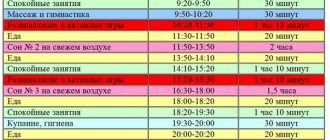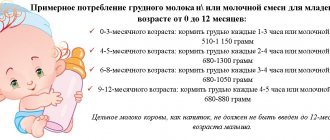How long does a 6 month old baby stay awake and sleep?
A baby's sleep at 6 months is not much different in duration from the sleep of a newborn. He sleeps between 13.5 and 16 hours a day. At the same time, he goes to bed 2-3 times during the day, and not 4 times, as before. At night the baby sleeps 10-12 hours, during the day - 3.5-4 hours. The period of complete transition to 2 naps a day can take up to 8 months.
Between bedtime, the baby has time to eat and play. Every day the period of wakefulness increases, as the baby develops rapidly, opportunities, skills and tasks change. Even during sleep, he may exhibit motor activity, which leads to constant anxiety and restless sleep.
Standard daily routine for a six month old baby
A 6 month old child should sleep 2-3 times a day. Each sleep is no more than 2 hours. The table contains information on how much sleep a baby should sleep at 6 months:
| Dream | Period |
| First | After waking up in the morning. No more than an hour. |
| Second | Dining. Lasts about 2 hours. |
| Third | Evening. The child sleeps for about an hour shortly before the main sleep. |
Babies sleep often and for a long time. Therefore, it is difficult even for parents to get used to the new daily routine. They are accustomed to the fact that the baby is almost not active, his requirements are kept to a minimum.
What affects a child's sleep
A 6-month-old child should sleep 2-3 times during the day. But even obedient children who have no problems with settling down begin to behave more cheerfully by the age of six months.
There are several reasons for this:
- Self-awareness. Children are already less attached to their mother.
- Progress in motor development. At six months the baby tries to sit up, skillfully rolls over, begins to crawl and stand up on his legs. Waking up in the middle of the night, the baby will most likely want to repeat the skills again. And you won’t be able to fall asleep on your own again. Therefore, the mother is forced to help the baby calm down.
The age of 6 months is the period when the diet changes and new products appear on the menu. It is not recommended to give complementary foods for testing before bedtime.
The body may react ambiguously to “strange” food, which will lead to pain in the stomach, loss of mood, and spoiled sleep.
Sleep norms for a six-month-old baby
How long does a one year old baby sleep?
A normally developing child, like an adult, has sleep phases:
- The first sleep, immediately after falling asleep, is heavy and deep. Mom may note that at this time there is an opportunity to leave the room, even make a little noise - the child sleeps without reacting to this.
Deep dream
- After about half an hour or a little later, the transition to another phase of sleep, superficial, begins. The child “emerges” from a state close to oblivion and dreams (a person dreams about something throughout the rest period, but only remembers what falls into the REM sleep phase). Environmental sounds at this moment are intricately woven into them; loud or harsh sounds can wake up the baby.
These two phases replace each other throughout the rest period. One such shift constitutes a cycle.
Important! If a mother finds that her child wakes up 30-40 minutes after falling asleep day and night, she should consult a neurologist. This means that the sleep mechanism has not yet been established, and during the transition from primary deep sleep to fast, superficial sleep, the baby wakes up. This is not a pathology at six months from birth, but you need to see a doctor. He will give advice on how to properly teach a little person to independently move from one phase to another.
The next norm for proper sleep is dividing it into daytime and nighttime rest periods. At six months, the baby must sleep during the day. An adult does not need such rest - he gets tired more difficult. For a child, even just looking around for a long time is tiring. A young, fragile psyche has a harder time coping with the abundance of impressions, but the baby is still mastering the movements of his own body. For a parent, this is similar to lifting a heavy barbell for three hours straight. So sleep during daylight hours is very important for your baby. Its norm is a rather vague concept, but the fact that it should exist is a fact.
Daytime nap
Rest during the day is needed. What should it be like? How much should a 6 month old baby sleep in total per day?
The general norm for sleep during daylight hours at six months, approved by pediatricians and neurologists, is from 2 to 6 hours, divided into 2-4 times. Usually babies sleep three times, each time for an hour and a half. Moreover, the middle daytime nap is longer, the morning and evening naps are short. Rest during the day for more than 6 hours is highly discouraged, as this directly affects night sleep.
Daytime sleep at home in a crib
Children at such a tender age have one interesting tendency. The fewer times they sleep, the longer their dreams. So, if a newborn baby can sleep a lot for 40 minutes, a six-month-old usually reduces the number of dreams, increasing their duration. By the age of one and a half years, the baby will sleep once, but only 2, or even 3 hours.
There is no clear framework for when a child should have, for example, two sleeps. When planning your day, you need to focus on the baby. So, if he favorably accepts the reduction of one rest break during the day, and does not become overexcited at night, then he is ready to update the regime. When, with two naps, the child is capricious, eats poorly, and, as mothers say, “goes overboard,” then they make the transition and continue to live with a schedule of three naps.
Ideally, the baby doesn’t care where exactly he falls asleep, as long as it’s in a familiar environment. With six-month-old babies, you can still go for a walk outside to sleep while it is light, to combine fresh air, rocking the stroller for better rest. You can go to bed at home.
Sleeping in a stroller
Attention! A child’s one-time refusal to sleep during the day does not mean that he needs to be removed. You need to think about correcting the regime if such a trend persists for several days in a row without external reasons.
Night sleep
Rest at night is fundamental to childhood development. It is during the deep sleep phases in the dark that the body produces growth hormones. Children with rest violations are usually immediately visible - they are smaller and weaker, so parents need to monitor the child very closely in this regard.
A 6-month-old baby usually needs about 10-12 hours to sleep at night. This time is divided, as in adults, into cycles. The total length of one such cycle is shorter - from an hour to an hour and a half. An adult, going through a change of cycles, does not wake up, but the child has not yet mastered this skill. Usually the transition from shallow sleep to deep sleep occurs smoothly, but when transforming in the other direction, the baby wakes up, feels fear or hunger, and cries to his parents about discomfort.
Baby woke up at night
What are sleep phases and how are they useful?
- Deep sleep is a time to cleanse the brain. Decay products are actively removed from it, and the brain processes signals received from internal organs. By the way, during this period a person also has dreams, but they are not remembered.
Deep sleep phase
- Superficial sleep is a phase in which consciousness is partially involved. The brain moves on to processing “digital” data, that is, emotions, impressions, sensations. At this time, the eyeballs are actively moving. In children, due to their still fragile psyche, movements of the limbs may be observed, which can serve as a reason for awakening. External sounds can also wake you up, since at this time the brain processes both accumulated and incoming information. Since somnologists and neurologists unanimously declare the benefits of this phase of sleep for brain development, measures must be taken to ensure that the baby does not wake up.
Interesting fact. Some of the sounds heard by a person in REM sleep seem to be integrated into the dream that he is currently seeing. People of all ages experience this. This phenomenon is a clear illustration of the benefits of this phase of sleep - the brain learns to adapt to external conditions.
Sleep norms table
If you average children's sleep standards, you get the following table.
Table of children's sleep norms
| Dreamtime | Number of dreams | Duration | Awakenings | Total amount of sleep |
| During the day | From 2 to 4 | From 2 to 4 hours (up to 6 is acceptable) | No | Around 2 p.m. |
| At night | 1 | 10-12 hours | 0-2 |
Parents should remember that these are averages. There is an individual norm that is easy to calculate. To do this, you need to record the total duration of the child's rest for five days, then sum up the results and divide by 5. You will get the number of hours of sleep that a particular child requires; you should focus on this number. For the purity of the experiment, the test should be carried out only if the child is healthy, and not during the period of vaccinations.
Important! There is no need to adjust the baby to the average norm. If parents are tormented by doubts and suspicions about the duration of their baby’s sleep, they should consult a neurologist for advice.
Why doesn't the child sleep
A baby's sleep standards at 6 months may be disrupted due to illness, external factors or other reasons. Most often, children show anxiety during the teething period. To alleviate the condition and calm down, you can anoint the gums with a special gel and give the baby a warm drink. Teethers help to cope with the problem by cooling and massaging inflamed gums, helping teeth to erupt.
Additional factors:
- Another reason for poor sleep is a hot indoor climate. The room should be no more than 26 degrees. The room must be ventilated at any time of the year, normalizing the temperature and humidity of the air.
- Colic in the stomach. An equally common cause of interrupted sleep is abdominal pain. Six-month-old children begin to receive new nutrition. Some foods are not immediately digested, which causes gas.
- Nasal congestion. This problem can be caused not only by a cold, but also by allergies.
- Uncomfortable sensations. The baby should sleep in loose clothing made from natural materials. It is equally important to change the diaper in a timely manner.
How to help your baby sleep more peacefully
- Before going to bed, take a walk in the fresh air. Choose quiet streets, away from heavy traffic.
- Carry out a daily bathing ritual. The water in the bath should be warm and pleasant for the baby. You can bathe your child in a decoction of mint, chamomile and other medicinal herbs. But use only mild plants, because herbs such as celandine can harm the skin of not only a baby, but also an adult. After bathing, dry him with a soft towel and massage with special oils or baby milk. There is a series of children's cosmetics that are intended for use just before bedtime. If you do this every day, your baby will get used to this routine and remember that after bathing he needs to go to bed. And warm water and massage will relax and prepare him for this.
- Try not to play active games before bed , don't make your baby laugh, don't play fast music, don't throw him in your arms. Before falling asleep, you need to be as quiet as possible. Turn off your TV, computer, and other sources of sound and radiation. Turn off the main lighting and turn on a night light with soft and dim light.
- Check the temperature and humidity in the children's room . Newborns need warmth much less than their mothers think. The room should not be stuffy and dry. Ideal conditions for sleeping are humidity of about 60% and temperature no higher than 20°C. Drying of the mucous membrane can become a serious discomfort for the baby, so he will wake up and cry at night.
- Feed your baby , he is still at the age when eating before bed is beneficial.
- Check if your baby has any skin irritation, use powder and put on a diaper. If you use simple gauze diapers, check your baby's condition throughout the night and change wet diapers.
- Make sure your baby is comfortable in the crib . It should have a firm mattress and a small pillow. Rough or scratchy bedding causes discomfort.
- Sing a lullaby or tell a story - the parents' voice has a beneficial effect on the baby's condition. It is believed that dad's monotonous voice puts you to sleep even faster than mom's lullaby.











